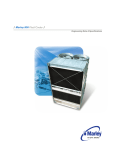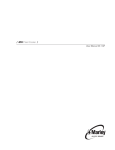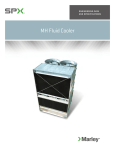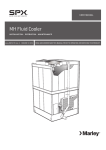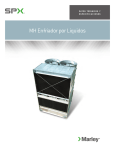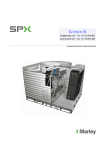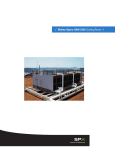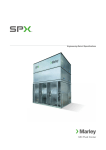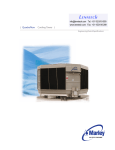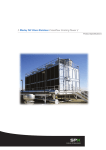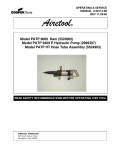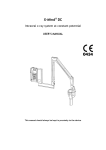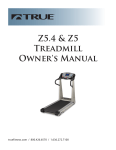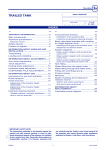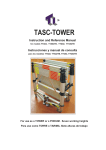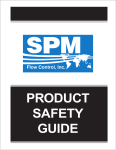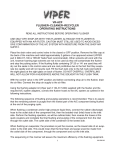Download MH Fluid Cooler
Transcript
Engineering Data & Specifications MH Fluid Cooler Marley / MH Fluid Cooler / Table of Contents Engineering Data Schematic – Single-Flow Models 4 5 Schematic – Double-Flow Models Support6 Freeze Prevention 7 8 Water Quality Specifications / Base Base9 Thermal Performance 9 Performance Warranty 9 Coil10 Design Loading 10 Construction10 Mechanical Equipment 11 12 Fill, Louvers and Drift Eliminators Distribution Basin 12 Casing, Fan Deck and Fan Guard 12 Access13 Collection Basin 13 Warranty13 Specifications / Options Stainless Steel Options Stainless Steel Collection Basin Stainless Steel Distribution Basin All Stainless Steel Fluid Cooler Stainless Steel Coil 14 14 15 15 Convenience and Safety Options Guardrail and Ladder Distribution Basin Access Platform Ladder Extension Ladder Safety Cage Access Door Platform Plenum Walkway Interior Mechanical Equipment Access Platform 15 16 16 16 16 17 17 Control Options Fan Motor Starter Control Panel Vibration Limit Switch Basin Heater Fan Motor Variable Speed Drive 17 18 18 19 Miscellaneous Options Dampers21 Gear Drive 21 Motor Out of the Airstream 21 Premium Efficiency Motor 22 High Temperature Fill 22 Air Inlet Screens 22 FM Approval 22 Marley / MH Fluid Cooler / The Marley MH Fluid Cooler is the most efficient system on the market—and your best choice for industrial and HVAC applications. By keeping the process fluid in a clean, closed loop, and combining the function of a cooling tower and heat exchanger into one system, they provide superior operational and maintenance benefits. The specifications portion of this publication not only relates the language to use in describing an appropriate MH Fluid Cooler—but also defines why certain items and features are important enough to specify with the intention of insisting upon compliance by all bidders. The left hand column of pages 9 thru 22 provides appropriate text for the various specification paragraphs, whereas the right hand column comments on the meaning of the subject matter and explains its value. 3 Pages 9 thru 13 indicate those paragraphs which will result in the purchase of a basic fluid cooler—one that accomplishes the specified thermal performance, but which will lack many operation—and maintenance-enhancing accessories and features that are usually desired by those persons who are responsible for the continuing operation of the system of which the fluid cooler is part. It will also incorporate those standard materials which testing and experience has proven to provide acceptable longevity in normal operating conditions. Pages 14 thru 22 provide paragraphs intended to add those features, components, and materials that will customize the fluid cooler to meet the user‘s requirements. Marley / MH Fluid Cooler / Engineering Data: Schematic 4 Use this data for preliminary layouts only. Obtain current drawing from your Marley sales representative. The Marley UPDATE web-based selection software —available at spxcooling.com—provides MH Fluid Cooler model recommendations based on customer's specific design requirements. 660mm PLAN VIEW L W H FLUID OUT INSTALLED HEIGHT ACCESS DOOR FLUID IN PUMP SIDE ELEVATION AIR INLET ELEVATION Dimensions mm Model Shipping Weight kg Motor kW Pump kW 2699 5.60 - 11.19 2.24 3289 7.46 - 14.92 3.73 7824 5162 11.19 - 22.38 3.73 11782 7743 16.79 - 33.57 5.60 Weight Heaviest Section 5182 4237 5182 5080 3632 5817 3632 5817 L W H MHF702 2769 2565 MHF703 3683 2565 MHF704 3683 MHF705 5512 Marley / MH Fluid Cooler / Engineering Data: Schematic 5 Use this data for preliminary layouts only. Obtain current drawing from your Marley sales representative. The Marley UPDATE web-based selection software —available at spxcooling.com—provides MH Fluid Cooler model recommendations based on customer's specific design requirements. PLAN VIEW L W H INSTALLED HEIGHT FLUID OUT ACCESS DOOR FLUID IN SIDE ELEVATION AIR INLET ELEVATION Dimensions mm Model Shipping Weight kg Motor kW Pump kW 10936 14.92 - 55.95 [email protected] 12719 22.38 - 55.95 [email protected] L W H Weight Heaviest Section MHF706 3632 7264 6706 16279 MHF707 4242 7874 6706 18738 Marley / MH Fluid Cooler / Engineering Data: Support 6 AIR INLET FACE 89 D 89 MODELS MHF702 THRU MHF705 D D MODELS MHF706 AND MHF707 Model D Maximum Deflection MHF702 2515 4.76 MHF703 2515 9.53 MHF704 3581 9.53 MHF705 3581 9.53 MHF706 3432 12.70 MHF707 3737 12.70 Use this data for preliminary layouts only. Obtain detailed support drawings from your Marley sales representative. Primary support consists of parallel I-beams running the full length of the unit. 89 Marley / MH Fluid Cooler / Engineering Data: Freeze Prevention Fluid Cooler Coil Fluid Cooling Recirculating Water When the ambient temperature falls below 0°C, heat loss from the coil be substantial even without recirculating water flowing over the coil. The process fluid, without an applied heat load, may be prone to freezing. There are various methods to protect against coil freezing. When the ambient air temperature falls below 0°C, the recirculating water within the fluid cooler can freeze. Marley Technical Report #H-003 “Operating Cooling Towers in Freezing Weather” describes how to prevent freezing during operation. Ask your Marley sales representative for a copy or download a copy at spxcooling.com. Ethylene and propylene glycol solutions are the best means to protect against coil freezing and are recommended for most installations. The appropriate concentration of ethylene or propylene glycol should be determined based on the required protection from low ambient temperatures. If the use of an industrial antifreeze solution is not compatible with the system, another accepted method of preventing coil freezing is to maintain a sufficient flow rate and heat load on the process fluid. The fluid exiting the coil must be maintained at or above 7°C at the full process flow rate. If the process load does not yield such a heat load, it may be necessary to apply a supplementary heat load to the process fluid. Draining the coil is not considered to be an acceptable means of protection against freezing. Introducing air to the interior of the bundle will promote corrosion of the heat exchanger coil. In an emergency, this alternative can be used in the event that the process fluid drops below 45°F, the ambient temperature is below freezing and the coils are not protected with industrial antifreeze. Cycling of the recirculating water pumps should not be used to control process flow temperatures. Coils may be used for seasonal dry operation followed by seasonal wet operation, but not for frequent cycling of the recirculating water pump. Such operation may lead to an excessive scale buildup resulting in a decrease in efficiency. During shutdown, water collects in the basin and may freeze solid. You can prevent freezing by adding heat to the water left in the basin—or, you can drain the tower and all exposed pipework at shutdown. Electric Basin Heaters An automatic basin water heater system, consisting of the following components: • Stainless steel electric immersion heater(s). Threaded couplings are provided in the side of the collection basin. • IP56 enclosure containing: Magnetic contactor to energize heater. Transformer to convert power supply to 24 volts for control circuit. Solid state circuit board for temperature and low-water cutoff. The enclosure may be mounted on the side of the fluid cooler. • Control probe in the collection basin to monitor water temperature and level. • Heat tracing for recirculating water pump. The basin heater option is only for freeze protection of the recirculation water in collection basin. The basin heater option does not protect the coil during freezing weather. Heater components are normally shipped separately for installation by others. Indoor Storage Tank CAUTION Freezing ambient conditions could cause significant damage to the heat exchanger coil of the MH Fluid Cooler. To avoid possible damage, it is imperative to provide for adequate freeze protection. With this type of system, water flows from an indoor tank and back to the tower where it is cooled and recirculated. The water flows by gravity from the fluid cooler to the tank located in a heated space. At shutdown, all exposed water drains into the tank where it is safe from freezing. The amount of water needed to successfully operate the system depends on the fluid cooler size and L/s and on the volume of water contained in the piping system to and from the tower. You must select a tank large enough to contain those combined volumes—plus a level sufficient to maintain a flooded suction on your pump. Control makeup water according to the level where the tank stabilizes during operation. 7 Marley / MH Fluid Cooler / Engineering Data: Water Quality The MH Fluid Cooler can be a very effective air washer. Atmospheric dust able to pass through the relatively small louver openings will enter the recirculating water system. Increased concentrations can intensify systems maintenance by clogging screens and strainers—and smaller particulates can coat system heat transfer surfaces. In areas of low flow velocity—such as the collection basin—sedimentary deposits can provide a breeding ground for bacteria. In areas prone to dust and sedimentation, you should consider installing some means for keeping the collection basin clean. Typical devices include side stream filters and a variety of filtration media. Blowdown Blowdown or Bleedoff is the continuous removal of a small portion of the water from the open recirculating system. Blowdown is used to prevent the dissolved solids from concentrating to the point where they will form scale. The amount of blowdown required depends on the cooling range— the difference between the hot and cold water temperatures of the closed circuit— and the composition of the makeup water. The MH Fluid Cooler is equipped with a blowdown line with metering valve connected directly to the overflow. Specific blowdown adjustment instructions and additional blowdown information can be found in the MH Fluid Cooler User Manual . CAUTION The fluid cooler must be located at such distance and direction to avoid the possibility of contaminated discharge air being drawn into building fresh air intake ducts. The purchaser should obtain the services of a Licensed professional Engineer or Registered Architect to certify that the location of the fluid cooler is in compliance with applicable air pollution, fire and clean air codes. Water Treatment To control the buildup of dissolved solids resulting from water evaporation, as well as airborne impurities and biological contaminants including Legionella, an effective consistent water treatment program is required. Simple blowdown may be adequate to control corrosion and scale, but biological contamination can only be controlled with biocides. An acceptable water treatment program must be compatible with the variety of materials incorporated in a fluid cooler—ideally the pH of the recirculating water should fall between 6.5 and 9.0. Batch feeding of the chemicals directly into the fluid cooler is not a good practice since localized damage to the fluid cooler is possible. Specific startup instructions and additional water quality recommendations can be found in the MH Fluid Cooler User Manual which accompanies the fluid cooler and also is available from your local Marley sales representative. For complete water treatment recommendations and services contact your local Marley sales representative. 8 Marley / MH Fluid Cooler / Specifications: Base Specifications 9 Specification Value 1.0Base: 1.1 Furnish and install an induced-draft, crossflow-type, factory assembled, galvanized steel, closed circuit fluid cooler. Unit shall consist of _____ cell(s), as shown on plans. The limiting overall dimensions of the tower shall be _____ wide, _____ long, and _____ high to the top of the fan guard. Total operating kilowatts of all fans shall not exceed _____ kW, consisting of _____ @ _____ kW motor(s). Tower shall be similar and equal in all respects to Marley Model _______. 2.0 Thermal Performance: 2.1 Water as the heat transfer fluid. The fluid cooler shall be capable of cooling _____ m3/hr of water from _____ °C to _____ °C at a design entering air wet-bulb temperature of _____ °C. Coil pressure drop shall not exceed _____ kPa. The thermal performance rating shall be Certified by the Cooling Technology Institute. 2.1 Aqueous glycol solution as the heat transfer fluid. The fluid cooler shall be capable of cooling _____ m3/hr of water from _____ °C to _____ °C at a design entering air wetbulb temperature of _____ °C. Coil pressure drop shall not exceed _____ kPa. The thermal performance rating shall be based on the Cooling Technology Institute certified performance rating adjusted for the thermal properties of the aqueous glycol solution used. 3.0 Performance Warranty: 3.1 CTI Certification notwithstanding, the cooling tower manufacturer shall guarantee that the fluid cooler supplied will meet the specified performance conditions when the tower is installed according to plans. If, because of a suspected thermal performance deficiency, the owner chooses to conduct an on-site thermal performance test under the supervision of a qualified, disinterested third party in accordance with CTI or ASME standards during the first year of operation; and if the tower fails to perform within the limits ➠ specification base establishes the type, configuration, base material, and ■ Your physical limitations of the fluid cooler to be quoted. During the planning and layout stages of your project, you will have focused your attention on a fluid cooler selection that fits your space allotment, and whose power usage is acceptable. Limitations on physical size and total operating horsepower avoid the introduction of unforeseen operational and site-related influences. Specifying the number of cells, and the maximum fan hp/cell will work to your advantage. The benefit of crossflow fluid coolers is that they are inherently easy to operate, access, and maintain. Unlike counterflow fluid coolers, crossflow fluid coolers have a spacious plenum between banks of fill for easy access to all of the tower’s internal components, and the water distribution system is adjacent to the fan deck. Certification means that the fluid cooler ■ CTI has been tested under operating conditions and found to perform as rated by the manufacturer under those circumstances. It assures the buyer that the tower is not intentionally or inadvertently undersized by the manufacturer. CTI certification alone is not sufficient to assure you that the fluid ■ However, cooler will perform satisfactorily in your situation. Certification is established under relatively controlled conditions, and fluid coolers seldom operate under such ideal circumstances. They are affected by nearby structures, machinery, enclosures, effluent from other sources, etc. Responsible and knowledgeable bidders will take such site-specific effects into consideration in selecting the fluid cooler—but the specifier must insist by the written specification that the designer/manufacturer guarantee this “real world” performance. Any reluctance on the part of the bidder should cause you some concern. Marley / MH Fluid Cooler / Specifications: Base Specifications 10 Specification Value of test tolerance; then the fluid cooler manufacturer will pay for the cost of the test and will make such corrections as are appropriate and agreeable to the owner to compensate for the performance deficiency. 4.0 Coil: 4.1 Coil(s) shall consist of fully welded box headers with serpentine coils and hot-dip galvanized after fabrication. Maximum operating design pressure shall be 1379 kPa. The coil shall be designed for free drainages of fluid at shutdown. Coil shall be warranted against any failure caused by defects in materials and workmanship for a period of eighteen (18) months from the date of tower shipment. 5.0 Design Loading: 5.1 The structure and anchorage shall be designed to withstand a wind load of 960 Pa on single-flow models and 1440 Pa on double-flow models while operating. The structure and anchorage shall be designed to withstand a seismic load of .11g on single-flow models and .18g on double-flow models while operating. The fluid cooler shall be designed to withstand shipping and hoisting loads of 2g horizontal or 3g vertical. The fan deck and hot water basin covers on doubleflow models shall be designed for 2.42 kPa live load or a 91 kg concentrated load. Guardrails, where specified, shall be capable of withstanding a 890N concentrated live load in any direction, and shall be designed in accordance with OSHA guidelines. 6.0 Construction: 6.1 Except where otherwise specified, all components of the fluid cooler shall be fabricated of heavy-gauge steel, protected against corrosion by Z600 galvanizing. After passivation of the galvanized steel (8 weeks at pH 7-8, and calcium hardness and alkalinity at 100-300 mg/L each), the fluid cooler shall be capable of withstanding water having a pH of 6.5 to 9.0; a chloride content up to 500 ppm as NaCl (300 mg/L as Cl-); a sulfate content (as SO4) up to 250 mg/L; a calcium content (as CaCO3) up to 500 mg/L; silica (as SiO2) up to 150 mg/L; ■ The MH Fluid Cooler coil is suitable for cooling water, oils, and other fluids compatible with carbon steel in a closed, pressurized system. Each coil is constructed of all-prime surface, continuous steel tubing, formed into a serpentine shape and welded into an assembly. Tubes are sloped to provide free drainage when vented. ■ The indicated design values are the minimum allowables under accepted design standards. They give you assurance that the fluid cooler can be shipped, handled, hoisted—and ultimately operated in a normal cooling tower environment. Most MH Fluid Cooler models will withstand significantly higher wind and seismic loads. If your geographic location dictates higher wind load or seismic load values, please make the appropriate changes, after discussion with your Marley sales representative. ■ ■ In the history of fluid coolers, no other coating for carbon steel has exhibited the success and longevity of galvanization in exposure to the normal cooling tower water quality defined at left. No paints or electrostatically-applied coatings, however exotic they may be, can approach galvanization's history of success. If extended longevity of the fluid cooler is required—or unusually harsh operating conditions are expected—consider specifying stainless steel as either the base construction material, or the material utilized for specific components of your choice. See Stainless Steel Options on page 12. Marley / MH Fluid Cooler / Specifications: Base Specifications 11 Specification Value and design operating ranges up to 28°C. The circulating water shall contain no oil, grease, fatty acids, or organic solvents. 6.2 The specifications, as written, are intended to indicate those materials that will be capable of withstanding the above water quality in continuing service, as well as the loads described in paragraph 6.1. They are to be regarded as minimum requirements. Where component materials unique to individual tower designs are not specified, the manufacturers shall take the above water quality and load carrying capabilities into account in the selection of their materials of manufacture. 7.0 Mechanical Equipment: 7.1 Fan(s) shall be heavy-duty, axial flow design. Fan(s) shall be driven through an industrial grade system of V-belts, pulleys, and tapered roller bearings. Bearings shall be rated at an L10 life of 40,000 hours, or greater. 7.2 7.3 Motor(s) shall be ____ kW maximum, Totally Enclosed, 1.15 service factor, variable torque, and specially insulated for cooling tower duty. Speed and electrical characteristics shall be 1500 RPM, single-winding, 3 phase, 50 hertz, ____ volts. The fan and fan drive assembly for each cell shall be supported by a rigid, galvanized steel structural support that resists misalignment. The mechanical equipment assembly shall be warranted against any failure caused by defects in materials and workmanship for no less than five (5) years following the date of tower shipment. This warranty is limited to the fan, fan shaft, bearings, sheaves and mechanical equipment support. The motor, motor components, pumps and belt(s) are warranted by their manufacturer. fans require ■ Propeller-type only half the operating hp of blower-type fans. The Marley drive system features all-aluminum sheaves, matched belts, and long-life bearings for dependable service. To reduce cost, some manufacturers may use TEAO motors, whose only source of cooling is the flow of air produced by the cooling tower fan. They are sometimes applied at kWs significantly beyond their nameplate rating. Unless otherwise specified, motor speed will be 1500 RPM, 50 Hertz on standard models. If you prefer the operating flexibility of two-speed operation, please specify two-speed, single-winding motors which offer full and half speeds for maximum energy savings. Incidentally, two speed motors are a far better choice than separate “pony” motors which simply double the problems indicated above. The value of a 5 year mechanical equipment warranty speaks for itself. Marley / MH Fluid Cooler / Specifications: Base Specifications 8.0 Fill, Louvers and Drift Eliminators: 8.1 Fill shall be film-type, thermoformed of 0.38 mm thick PVC, with louvers and eliminators formed as part of each fill sheet. Fill shall be suspended from galvanized structural tubing supported from the tower structure. 8.2 Coil louvers and eliminators shall be filmtype, thermoformed of 0.43mm thick PVC and shall be easily removable for access to tube bundle 8.3 Fill and coil drift eliminators shall be triple-pass, and shall limit drift losses to no more than 0.005% or less of the design water flow rate of the recirculating water. The air inlet face of the tower shall be free of water splash-out. 9.0 Distribution Basins: 9.1 An open basin above the fill with removable interchangeable polypropylene nozzles installed in the floor of the basin shall provide full coverage of the fill by gravity flow. Basin shall be installed and sealed at the factory and shall be equipped with removable, galvanized steel covers. 9.2 A redistribution basin below the fill with polypropylene nozzles installed in the floor of the basin shall provide full coverage of the coil at a flow rate sufficient to ensure complete wetting of the coil at all times. 10.0 Casing, Fan Deck and Fan Guard: 10.1 The casing and fan deck shall be heavy gauge Z600 galvanized steel panels. The top of the fan cylinder(s) shall be equipped with a conical, non-sagging, removable fan guard, fabricated of welded 8mm and 7 gauge rods and hot-dip galvanized after fabrication. 12 Specification Value ■ Louvers integral with the fill keep the flowing water within the confines of the fill. The separate external louvers used by others permit water to escape the fill and form ice or produce an unsightly situation adjacent to the tower. If you plan to use your tower in the wintertime, particularly for free cooling, integral louvers will put your operating concerns to rest. ■ Drift rate varies with design water loading and air rate, as well as drift eliminator depth and number of directional changes. A drift rate of 0.001% is readily available on many standard models. If a lower rate is required, please discuss with your Marley sales representative. ■ Gravity-flow distribution basins are a feature of the MH Fluid Cooler resulting in operating pump heads less than that encountered in fluid coolers with pressurized spray systems. Also, these basins are out where they can be easily inspected—even maintained—while the fluid cooler is in operation. Spray systems are extremely awkward to access and maintain. Also, the plastic basin covers offered by some manufacturers are incapable of supporting the loads imposed in maintenance. They will, therefore, tell you that it is really unnecessary for you to ever go to the top of their towers and—if you do have to—that it is better for you to work from the top of a portable ladder! ■ Manufacturers who use materials other than heavy-gauge steel for fan decks may be unable to meet your specified loading requirements. Fan decks on the larger models—MHF706 and MHF707—are designed to be used as a working platform. Marley / MH Fluid Cooler / Specifications: Base Specifications 11.0 Access: 11.1 A large galvanized, hinged, steel access door 711mm wide and 1066mm high shall be located on both endwalls for entry into the cold water basin and fan plenum area. Access doors shall be operable from inside as well as outside the tower. 12.0 Collection Basin: 12.1 The collection basin shall be heavy-gauge galvanized steel. Suction connections shall be equipped with galvanized debris screens. A factory-installed, float-operated, mechanical makeup valve and waste water blowdown line shall be included. A 4" diameter PVC drain and overflow shall be provided in each cell of the tower. The basin shall include a depressed section into which accumulated silt can be flushed to permit cleaning. The basin floor adjacent to the depressed section shall slope toward the depressed section to prevent buildup of silt under the coil area. 12.2 Recirculation pump(s) shall be mounted to the collection basin in conjunction with a suction assembly. Recirculation piping shall be schedule 40 PVC. A blowdown line with metering valve shall be connected directly to the tower overflow. 13.0 Warranty: 13.1 The fluid cooler shall be free from defects in materials and workmanship for a period of eighteen (18) months from the date of shipment. 13 Specification Value ■ Access doors on other manufacturer’s towers may be 18" wide or smaller, which is unreasonably small for a human being. Specifying the size of the door will cause those bidders to take exception, alerting you to a potential maintenance headache. Two doors are standard on all MH Fluid Coolers—one in each endwall. The removable-standpipe type of overflow is valuable because it provides a way to achieve flush-out cleanability. Other drains may be as little as 25mm diameter, making flush-out cleaning impractical at best. Location of the coil in the lower portion of the MH Fluid Cooler makes it much easier to access for cleaning and inspection. Marley / MH Fluid Cooler / Specifications: Options Specifications Stainless Steel Options Stainless Steel Collection Basin: 12.1: Replace paragraph 12.1 with the following: The cold water basin shall be heavyguage series 300 welded stainless steel. Suction connections shall be equipped with stainless steel debris screens. A factory-installed, float-operated, mechanical makeup valve and waste water blowdown line shall be included. A 4" diameter PVC drain and overflow shall be provided in each cell of the tower. The basin shall include a depressed section into which accumulated silt can be flushed to permit cleaning. The basin floor adjacent to the depressed section shall slope toward the depressed section to prevent buildup of silt under the coil area. All steel items which project into the basin (coil supports, anchor clips, etc) shall also be made of stainless steel. Stainless Steel Distribution Basin: 9.1 Replace paragraph 9.1 with the following: An open stainless steel basin above the fill with removable interchangeable polypropylene nozzles installed in the floor of the basin shall provide full coverage of the fill by gravity flow. Basin shall be installed and sealed at the factory and shall be equipped with removable, stainless steel covers capable of withstanding the loads described in paragraph 5.1. All components of these basins with the exception of the nozzles and redistribution piping shall be stainless steel. 9.2 Replace paragraph 9.2 with the following: A redistribution basin below the fill with removable interchangeable polypropylene nozzles installed in the floor of the basin shall provide full coverage of the coil at a flow rate sufficient to ensure complete wetting of the coil at all times. All components of the basin with the exception of the nozzles shall be stainless steel. 14 Specification Value cold water basin is the only part of the tower that is subject to periods of ■ The stagnant water, concentrated with treatment chemicals and customary contaminants. It is also the most expensive and difficult part of any tower to repair or replace. For these reasons, many customers—particularly those who are replacing older towers—choose to specify stainless steel cold water basins. ■ It would also be advisable to change the fill support tubes in Paragraph 8.1 from galvanized structural tubing to 300 stainless steel structural tubing. Marley / MH Fluid Cooler / Specifications: Options Specifications All Stainless Fluid Cooler: 6.1 Replace paragraph 6.1 with the following: Except where otherwise specified, all components of the fluid cooler shall be fabricated of heavy-gauge, series 300 stainless steel. The tower shall be capable of withstanding water having a chloride content (NaCl) up to 750 mg/L; a sulfate content (SO4) up to 1200 mg/L; a calcium content (CaCO3) up to 800 mg/L; silica (SiO2) up to 150 mg/L; and design operating ranges up to 28°C. The circulating water shall contain no oil, grease, fatty acids, or organic solvents. Stainless Steel Coil: 4.1 Replace paragraph 4.1 with the following: Coil(s) shall consist of fully welded box headers with serpentine coils. All coil components shall be assembled from series 300 stainless steel. Maximum operating design pressure shall be 1379 kPa. The coil shall be designed for free drainages of fluid at shutdown. Coil shall be warranted against any failure caused by defects in materials and workmanship for a period of eighteen (18) months from the date of tower shipment. Convenience and Safety Options Guardrail and Ladder: MHF706 and MHF707 models only 11.2 Add the following paragraph in the Access section: The top of the fluid cooler shall be equipped with a sturdy guardrail, complete with kneerail and toeboard, designed according to OSHA guidelines. Guardrails and kneerails shall consist of 42mm O.D. x 15 gauge galvanized structural tubing, the guardrail of which shall be capable of withstanding a 890N concentrated live load in any direction. Posts are 51mm x 51mm square structural tubing and shall be spaced on centers of 2438mm or less. A 457mm wide aluminum ladder with 76mm I-beam side rails and 32mm diameter rungs shall be permanently attached to the endwall casing of the fluid cooler, rising from the base of the fluid cooler to the top of the guardrail. 15 Specification Value pure resistance to corrosion—coupled with the capability to meet stringent ■ For fire and building codes—there is no substitute for stainless steel. No paints or electostatically-applied coatings, however exotic they may be, can match stainless steel's ability to withstand adverse operating conditions. ■ For process fluids that are not compatible with the standard galvanized steel construction, stainless steel offers you the ultimate in corrosion resistance and long life. The thermal performance rating shall be based on the Cooling Technology Institute certified performance rating adjusted for the thermal properties of stainless steel. ■ Good maintenance practice requires periodic access to the top of the fluid cooler to inspect the distribution basins as well as the structural integrity of the fan deck, fan guard, fan cylinder and fan—especially the fan blade securing hardware. These models are large enough to accommodate this convenience. For the comfort and safety of your operating personnel, we recommend that you specify a ladder and guardrail on these models Portable ladders and other “make-do” access means are inappropriate for equipment of this size and complexity. Also, fixed ladders without fan deck guardrails invite unsafe maintenance practices and must not be allowed. Marley / MH Fluid Cooler / Specifications: Options Specifications Distribution Basin Access Platform: 11.2 Add the following paragraph in the Access section: Provide an external platform near the top of the louver face for access to the hot water distribution system. The platform shall be heavy gauge galvanized steel with safety grip perforations, supported by galvanized steel framework attached to the fluid cooler. The platform shall be surrounded by a guardrail, kneerail, and toeboard. A permanently attached 457mm wide aluminum ladder with 76 mm I-beam side rails and 32 mm diameter serrated rungs shall extend from the base of the tower to the top of the guardrail. Ladder Extension: 11.2 Add the following to the end of paragraph 11.2: Provide a ladder extension for connection to the foot of the ladder. This extension shall be long enough to rise from the roof (grade) level to the base of the fluid cooler. The installing contractor shall be responsible for cutting the ladder to length; attaching it to the foot of the fluid cooler ladder; and anchoring it at its base. Ladder Safety Cage: 11.3 Add the following paragraph in the Access section: An aluminum safety cage shall surround the ladder, extending from a point approximately 2m above the foot of the ladder to the top of the guardrail surrounding the fan deck or platform. Access Door Platform: 11.4 Add the following paragraph in the Access section: There shall be an access platform at the base of the fluid cooler extending from the vertical ladder to the endwall access door. The platform shall be galvanized steel bar grating, supported by galvanized steel framework attached to the fluid cooler. The platform shall be surrounded by a guardrail, kneerail, and toeboard. 16 Specification Value ■ Periodic inspection and maintenance of a fluid cooler distribution system is fundamental to preserving maximum cooling system efficiency. All fluid coolers— crossflow or counterflow—are subject to clogging to varying degrees by waterborne contaminants such as pipe scale and sediment. Therefore, safe and easy access to these components is of significant value to the operator. Access can be provided in a number of ways, including portable ladders or scaffolding, but for maximum safety and convenience, a field installed Marley access platform with guardrails is available to make this task as safe and userfriendly as possible. Further, its location on the side of the tower does not add to the height of the unit, preserving architectural integrity. It also saves the owner time and money, in that maintenance personnel may devote their time to inspection rather than searching for ladders or erection of portable scaffolding. ■ Many fluid coolers are installed such that the base of the unit is 610 mm or more above the roof or grade level. This makes it difficult to get up to the foot of the attached ladder. The ladder extension alleviates this problem. Marley ladder extensions are available in standard 1.5m and 3.4m lengths. ■ To meet OSHA guidelines, towers whose fan decks are 20'-0" (6.096m) or more above roof or grade, and which are equipped with ladders, should have safety cages surrounding the ladders, but with approximately 2m clear headroom. ■ Where fluid coolers are installed on an elevated grillage or piers, it is often difficult to get to—and through—the access door conveniently. This platform provides easy, safe, and comfortable access to that door. It also extends beyond the door to provide ready access to the optional Control System. Marley / MH Fluid Cooler / Specifications: Options Specifications 17 Specification Value Plenum Walkway: MHF706 and MHF707 models—standard on others. 11.5 Add the following paragraph in the Access section: Provide a factoryinstalled, heavy gauge galvanized steel walkway with safety grip perforations, extending from one endwall access door to the other endwall access door. This walkway shall be supported by a galvanized steel framework, and the top to the walkway shall be at or above the cold water basin overflow level. Interior Mechanical Equipment Access Platform: MHF706 and MHF707 models require plenum walkway option. 11.6 Add the following paragraph in the Access section: An internal ladder shall extend upward from the plenum walkway to an elevated fiberglass bar grating platform convenient to the care and maintenance of the fluid cooler's mechanical equipment. The platform shall be surrounded by a sturdy guardrail and kneerail system. Control Options Fan Motor Starter Control Panel: 6.4 Add the following paragraph in the Mechanical Equipment section: Each cell of the cooling tower shall be equipped with a UL / CUL 508 listed control panel in an IP14 or IP56 outdoor enclosure capable of controlling single-speed or two-speed motors as required, and designed specifically for cooling tower applications. The panel shall include a main circuit breaker or main fused disconnect with an external operating handle, lockable in the off position for safety. Full voltage non-reversing magnetic starter shall be controlled with a thermostatic or solid-state temperature controller. Door mounted selector switches shall be provided to enable automatic or manual control and wired for 120VAC control. Control circuit to be wired out to terminal blocks for field connection to a remote vibration switch, overload trip alarms and remote temperature control devices. The temperature controller shall be adjustable for the required cold-water temperature. If a thermostatic controller ➠ ■ A galvanized steel walkway enables easy access to inspect collection basin items such as the coil, coil eliminators, sump screen and make-up valve and provides a dry working area to view and access the drive system. ■ An elevated fiberglass bar grating service platform with aluminum ladder provides a permanent working surface to inspect and maintain the mechanical equipment components. ■ If it is your opinion that the control system for the fluid cooler be part of the fluid cooler manufacturer’s responsibility, we are in wholehearted agreement with you. Who better to determine the most efficient mode and manner of a fluid cooler’s operation—and to apply a system most compatible with it—than the designer and manufacturer of the fluid cooler? Marley variable speed drives are also available for the ultimate in temperature control, energy management, and mechanical equipment longevity. Marley / MH Fluid Cooler / Specifications: Options Specifications Specification Value is used it shall be mounted on the side of the tower with the temperature sensing bulb installed in the cold water basin using a suspension mounting bracket. If a solid-state temperature controller is used the controller will be door mounted on the control panel. The solid-state temperature controller will display two temperatures, one for outgoing water and the other for set point. Water temperature input shall be obtained using a three-wire RTD with dry well in the outlet water piping and wired back to the solid-state temperature controller in the control panel. Vibration Limit Switch: 6.5 Add the following paragraph in the Mechanical Equipment section: A singlepole, double-throw vibration limit switch in a IP56 housing shall be installed on the mechanical equipment support for wiring into the owner’s control panel. The purpose of this switch will be to interrupt power to the motor in the event of excessive vibration. It shall be adjustable for sensitivity, and shall require manual reset. Basin Heater: 11.2 Add the following paragraph in the Cold Water Basin section: Provide a system of electric immersion heaters and controls for each cell of the tower to prevent freezing of water in the collection basin during periods of shutdown. The system shall consist of one or more stainless steel electric immersion heaters installed in threaded couplings provided in the side of the basin. A IP56 enclosure shall house a magnetic contactor to energize heaters; a transformer to provide 24 volt control circuit power; and a solid state circuit board for temperature and low water cut-off. A control probe shall be located in the basin to monitor water level and temperature. The system shall be capable of maintaining 5°C water temperature at an ambient air temperature of____ °C. ■ Unless specified otherwise, a Marley M-5 vibration switch will be provided. The requirement for manual reset assures that the fluid cooler will be visited to determine the cause of excessive vibration. ■ The Marley basin heater components described at left represent our recommendation for a reliable automatic system for the prevention of basin freezing. They are normally shipped separately for installation at the jobsite by the installing contractor. When purchased in conjunction with the enhanced Control System option, however, they are customarily factory-mounted and tested. Submerged in basin water, in which zinc ions are present, copper immersion heaters must not be used. Insist upon stainless steel. The ambient air temperature that you insert in the specifications should be the lowest 1% level of winter temperature prevalent at site. 18 Marley / MH Fluid Cooler / Specifications: Options Specifications Fan Motor Variable Speed Drive: Marley All Weather ACH550 System 6.4 Add the following paragraph in the Mechanical Equipment section when VFD is used with customers Building Management System: A complete UL listed Variable Speed Drive system in a IP10 indoor, IP52 indoor or IP54 outdoor enclosure shall be provided. The VFD shall use PWM technology with IGBT switching and integrated bypass design. VFD out put switching shall not cause mechanical issues with gearbox teeth or drive shafts. The VFD shall catch a fan spinning in the reverse direction without tripping. The panel shall include a main disconnect with short circuit protection and external operating handle, lockable in the off position for safety. The VFD system shall receive a speed reference signal from the Building Management System monitoring the tower fluid temperature. As an option to receiving the speed reference signal from a building management system, the drive must have the capability to receive a 4-20 ma temperature signal from an RTD transmitter. The VFD shall have an internal PI regulator to modulate fan speed maintaining set point temperature. The drive's panel display shall be able to display the set-point temperature and cold-fluid temperature on two separate lines. The bypass shall include a complete magnetic bypass circuit and with capability to isolate the VFD when in the bypass mode. Transfer to the bypass mode shall be manual in the event of VFD failure. Once the motor is transferred to the by-pass circuit the fan motor will run at constant full speed. The bypass circuit will not modulate ON and OFF based on fluid temperature. The application must be able to handle very cold fluid temperatures while the VFD is in a by-pass mode. Operator controls shall be mounted on the front of the enclosure and shall consist of start and stop control, bypass/VFD selection, Auto/ Manual selections, manual speed control. To prevent heating problems in the fluid cooler fan motor and to assure proper gear reducer lubrication the VFD system shall de energize the motor once 25% motor speed is reached and cooling is no longer required. The fluid cooler manufacturer 19 Specification Value ■ Marley VFD drive systems are designed to combine absolute temperature control with ideal energy management. The fluid cooler user selects a cold water temperature and the drive system will vary the fan speed to maintain that temperature. Precise temperature control is accomplished with far less stress to the mechanical equipment components. The improved energy management provides fast payback. Motors operated on a VFD shall carry a service factor of 1.0. When operating on a VFD, the drive parameters should be programmed to limit the current to motor nameplate hp. Adjust the Motor specification accordingly. Marley / MH Fluid Cooler / Specifications: Options Specifications shall supply VFD start-up assistance. Tower vibration testing throughout the speed range is required to identify and lockout any natural frequency vibration levels which may exceed CTI guidelines. Marley Premium VFD System: 6.4 Add the following paragraph in the Mechanical Equipment section when VFD is used as a stand alone system: A complete UL listed Variable Speed Drive system in a IP52 indoor or IP54 outdoor enclosure shall be provided. The VFD shall use PWM technology with IGBT switching and integrated bypass design. VFD output switching shall not cause mechanical issues with gearbox teeth or drive shafts. The VFD shall catch a fan spinning in the reverse direction without tripping. The panel shall include a main disconnect with short circuit protection and external operating handle, lockable in the off position for safety. The system shall include a solid state, PI temperature controller to adjust frequency output of the drive in response to the tower fluid temperature. The temperature of the fluid and set point shall be displayed on the door of the control panel. The bypass shall include a complete magnetic bypass circuit with capability to isolate the VFD when in the bypass mode. Transfer to the bypass mode shall be automatic in the event of VFD failure or for specific trip conditions allowing safe transfer of utility voltage to the motor. Automatic bypass with an earth ground condition is not allowed. The bypass contactor shall be cycled on and off while operating in bypass, to maintain the set-point temperature of the cold water. The drive design shall be operated as a stand-alone system without the need for a BMS system. Operator controls shall be mounted on the front of the enclosure and shall consist of start and stop control, bypass/VFD selector switch, Auto/Manual selector switch, manual speed control, and solid-state temperature controller. An emergency bypass selector switch internal to the panel allowing the fluid cooler fan motor to be run at full speed shall be furnished. To prevent heating problems in the fluid cooler fan motor and to assure proper gear box lubrication the VFD system shall de energize the motor once 25% motor speed is reached and cooling is no longer required. The VFD shall include de-icing logic with auto canceling and adjustable time. Speed Specification Value 20 Marley / MH Fluid Cooler / Specifications: Options Specifications 21 Specification Value in De-Ice mode shall not exceed 50% motor speed. The fluid cooler manufacturer shall supply VFD start-up assistance. Tower vibration testing throughout the speed range is required to identify and lockout any natural frequency vibration levels which may exceed CTI guidelines. Miscellaneous Options Positive Closure Dampers: 4.2 Add the following paragraph in the Coil section: Provide positive closure actuating dampers to prevent air from flowing through the coil section when the dampers are closed. All linkage and axles shall be stainless steel and the blade bearings shall be corrosion resistant, molded synthetic bearings. Damper blades shall be single-skin constructed from G60 galvanized steel. Damper frame shall also be manufactured from G60 galvanized steel. Damper actuators shall be either pneumatic or electric depending on customer's preference. Dampers shall be field installed and actuators shall be wired by others. Gear Drive: MHF706 and MHF707 models only. 7.1 Replace paragraph 7.1 with the following: Fan(s) shall be propeller-type, incorporating aluminum alloy blades and galvanized steel hubs. Blades shall be individually adjustable. Fan(s) shall be driven through a right angle, industrial duty, oil lubricated, geared speed reducer that requires no oil changes for the first five (5) years of operation. Motor Out of the Airstream: MHF706 and MHF077 models only with gear drive option. 7.1 Add the following to the end of paragraph 7.1: The motor shall be mounted outside the casing of the fluid cooler and shall be connected to the gear reducer by a dynamically-balanced, stainless steel tube and flange drive shaft. closure dampers give you the added security of safe operation in freez■ Positive ing weather. Heat loss data from the coil can be obtained by accessing the Marley UPDATE web-based selection software at spxcooling.com. Pneumatic damper actuators are UL approved, totally enclosed with spring return actuators. Electric actuators are industrial grade, IP56 rated, 2-position drive both ways. The damper section protrudes from the louver face a minimum of 150mm. ■ The exclusive Marley System5 Geareducer® requires no oil changes for five years, offering you unmatched reliability and low maintenance. ■ For many years, a feature of Marley cooling towers was that the electric motors were located outside the fan cylinders, where they were easily accessible, and where they were not subjected to the constant humidity that exists inside the tower plenum. Although improved motor designs (insulation, bearings, seals, and lubricants) have now made it feasible for us to locate the motor inside in close-coupled proximity to the Geareducer, many users still prefer the motor to be located outside the humid airstream. If you are among those users—or are among those who see the wisdom of their thinking—please specify this option. Marley / MH Fluid Cooler / Specifications: Options Specifications Premium Efficiency Motor: 7.3 Replace paragraph 7.3 with the following: The fan and fan drive assembly for each cell shall be supported by a rigid, welded, hot dip galvanized steel structural support that resists misalignment. The mechanical equipment assembly shall be warranted against any failure caused by defects in materials and workmanship for no less than five (5) years following the date of tower shipment. This warranty shall cover the fan, speed reducer, motor, drive shaft and cou-plings, and the mechanical equipment support. The bearing assemblies and V-belts shall be warranted for 18 months. High Temperature Fill: 8.1 Replace paragraph 8.1 with the following: Fill shall be film-type, thermoformed of 0.51mm thick high-temperature PVC, with louvers and eliminators formed as part of each fill sheet. Fill shall be suspended from stainless steel structural tubing supported from the tower structure. Air Inlet Screens: 8.4 Add the following paragraph: The air inlet faces of the top module fill area of the fluid cooler shall be covered by 1" mesh hot dip galvanized welded wire screens. Screens shall be mounted in galvanized steel U-edging and shall be removable. FM Approval: 6.3 Add the following paragraph in the Construction section: The tower shall include all design and material modifications necessary to meet the fire rating requirements of Factory Mutual. The product proposed shall be listed in the FM Approval Guide, latest edition. 22 Specification Value process fluid above 57°C. ■ For ■ In wooded or windy areas, these screens help to keep leaves or blowing debris out of the cooling tower and circulating water system. ■ This could have a very beneficial effect upon your fire insurance premiums. Towers not able to meet FM requirements may require the inclusion of a fire protection sprinkler system to achieve a comparable level of insurance premium cost. Even if you are not insured by FM, this requirement ensures that each cell will contain any fire that may occur without losing the ability of limited operations and capacity. SPX COOLING TECHNOLOGIES 3 KNIGHTSBRIDGE PARK WAINWRIGHT ROAD WORCESTER WR4 9FA UNITED KINGDOM 44 (0) 1905 750 270 [email protected] spxcooling.com In the interest of technological progress, all products are subject to design and/or material change without notice. ©2011 SPX | uk_MHF-TS-11
























